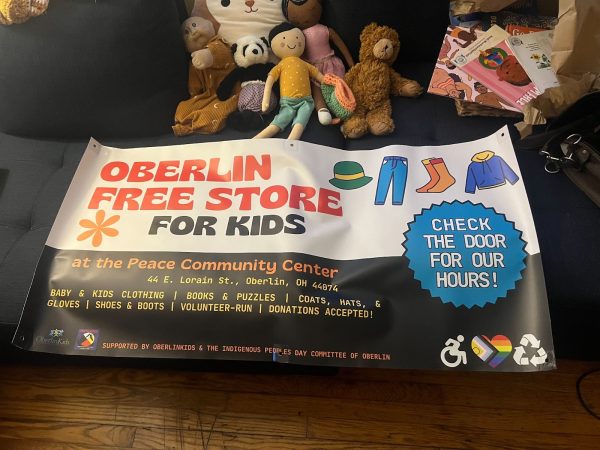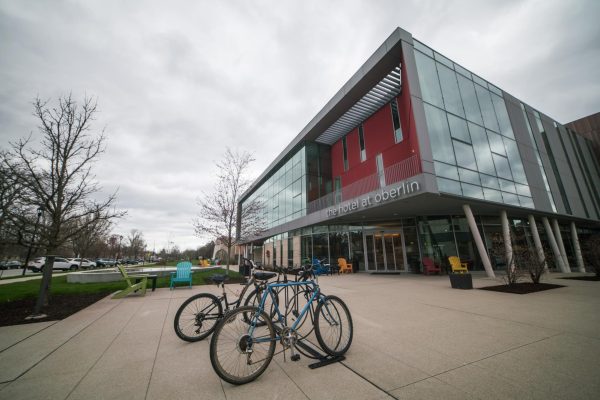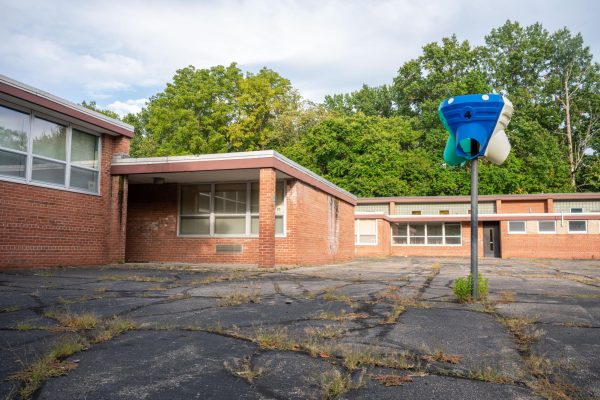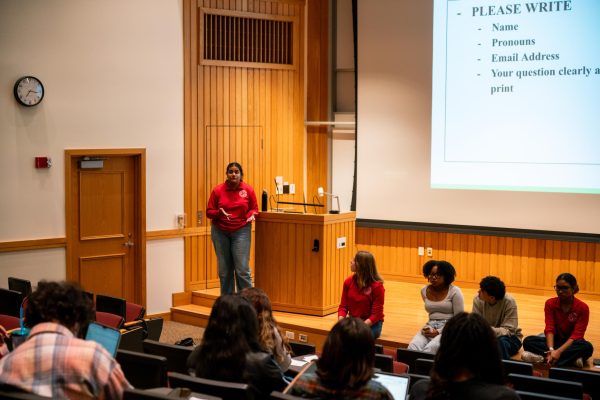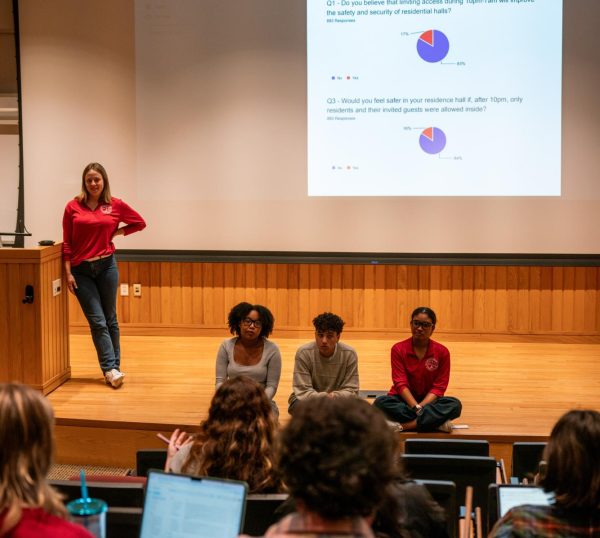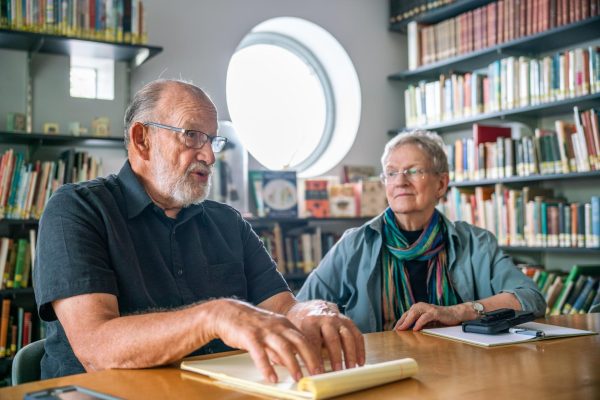City Council Candidates Prepare for Election
Oberlin City Council elections are coming up next month, and with eight candidates vying for seven seats, local campaigning is in full swing. Five of the candidates are incumbents, two have served on Council before, and one is a new candidate. Every two years, the city holds elections for all seven council seats. The Review sat down with some candidates to discuss their campaigns, experience, and hopes for Oberlin before the Nov. 7 election.
Council President Bryan Burgess, Vice President Sharon Pearson, and councilmembers Ronnie Rimbert, Kelley Singleton, and Linda Slocum will each be running as incumbents. William Jindra and Kristin Peterson, who have each served on council before, are also running. Heather Adelman will be running for the first time.
Heather Adelman
Adelman, a California native, is the sole first-time candidate running in the upcoming City Council election. She is a co-founder of the Oberlin Food Hub, she is on the board of Oberlin Community Services, which is a nonprofit in town that helps people pay for food, bills, and other expenses, and has worked with the Oberlin Project. She has also worked for the Environmental Protection Agency, working specifically with tribal communities. Adelman is most passionate about supporting sustainability initiatives, encouraging job creation and economic development, and preserving the integrity of drinking water.
Adelman is running for Council because of a deep commitment to public service.
“Community involvement and public service really are in my bones. It is the theme that ties together my life decisions, it really dictated where I went to school, what I studied in school, and the jobs that I took and am currently working. I want to make a difference in the communities that I live in. I love Oberlin, it’s a phenomenal community, and I have always been really interested in politics. In fact, as a little girl, if you asked me what I wanted to be when I grew up, I always said — my mom claims as early as four years old all [the way] through high school — I said the first woman president of the United States. It has been something that I have wanted to do my whole life and if not now, when would possibly be a better time to try to make this world a better place?”
William Jindra
Jindra is a retired law enforcement officer who recently retired from his position as chief bailiff at the Oberlin Municipal Court, where he worked for 10 years. He served on City Council from 2000–2005. Some of the issues he is most passionate about include fighting the NEXUS pipeline and working on Oberlin’s climate action plan, as well as creating a plan in case President Trump follows through on discussions to privatize the Federal Aeronautics Administration — which has a facility in Oberlin.
He saw the events around last year’s Gibson’s protests as one of the central issues in city-College relations.
“When President Krislov and the administration said that that would be ‘thoroughly investigated’ and there would be some determination as far as what actually happened — the Gibsons were accused of racially profiling people, and I think that the county or city prosecutor and the city police chief have done studies to show that the shoplifting incidents were all over the spectrum, that it didn’t matter what the race was, whether they were college students … Gibson’s has a high incidence of shoplifting incidents, and I think there needs to be more of a discussion about what the College findings were and there needs to be some closure to that.”
Linda Slocum
Slocum is running for her second term on City Council where she serves as the council’s vice president. During her time in Oberlin she has helped re-establish the League of Women Voters. She is interested in improving the housing stock, providing ways that people can get low-interest loans, and clarifying Oberlin’s governance process. She sees herself as a “moderating voice in council,” specializing in finding workable solutions to complex problems.
She sees city-College cooperation and communication as an essential component to future success.
“I think that it’s a big challenge for the city, the college and other stakeholders in town to work together, partly because … we have the same mutual interests, when you get right down to it. Affordable housing, a vibrant downtown, public transportation, a healthy infrastructure … there are so many things where we can cooperate working together. I think we’re in a good position right now with the new city manager, a new college president, to kind of shake things up, re-think. … We don’t have to be doing things the old way that we’ve been doing things. Because people are new, they can bring fresh ideas on how to work together, and I’d like to see better coordination. More talking, more understanding, More mutual working on projects that do affect us all.
Kelley Singleton
Singleton is an Oberlin native who is running for his second term on City Council. Singleton plans to focus on economic development if elected for a second term on the council. He wants to solve the city’s property tax deficit which results from the disproportionately large amount of tax-exempt property in Oberlin. He is interested in exploring the possibility of medical marijuana facilities in Oberlin and increasing protections for LGBTQ community members.
He discussed his efforts to increase jobs in Oberlin.
“You need to have places that businesses can grow. The city has a few properties [where] they’ve done a nice transition where those properties were staying within the city. They have channeled their marketing of those to a different group: the Oberlin Community Improvment Corporation investment group. It’s a group that will actively market the city properties that we have. They also work with the industrial park that we have, helping with new business just coming in this month which will create 35 jobs for the city and they are good paying jobs. When it first came up, I was really pushing for the city to — and we did pass a resolution and agreement to it — that we would try to get medical marijuana in Oberlin. As far as processing, growing, testing, dispensaries; those are good paying jobs.”
Bryan Burgess
Burgess has served on the city council for eight years and currently serves as city council president. His goals for the city include establishing a storm-water utility system for the city and continuing his work on sustainable energy. If reelected, this upcoming term will be the final consecutive term he can serve without taking two years off.
If reelected, he hopes this final term would allow him to finalize his work on making Oberlin environmentally friendly.
“When I first ran for council, we were trying to decide if we made the right decision in walking away from fossil-fuel based energy, and moving over to a green portfolio. That’s largely done — and that is largely why I got elected on council — and seeing this issue directly through to the end is really…that’s my main goal. We made the hard decision to move away from fossil fuels, and are now powered in a green economy, and now that we’ve done that our electric rates are the lowest in Lorain County — they’re the lowest in the region — we’ve made this switch and we’ve done it in a cost-effective manner.”
Kristin Peterson, Sharon Pearson, and Ronnie Rimbert did not respond to requests for interviews.


